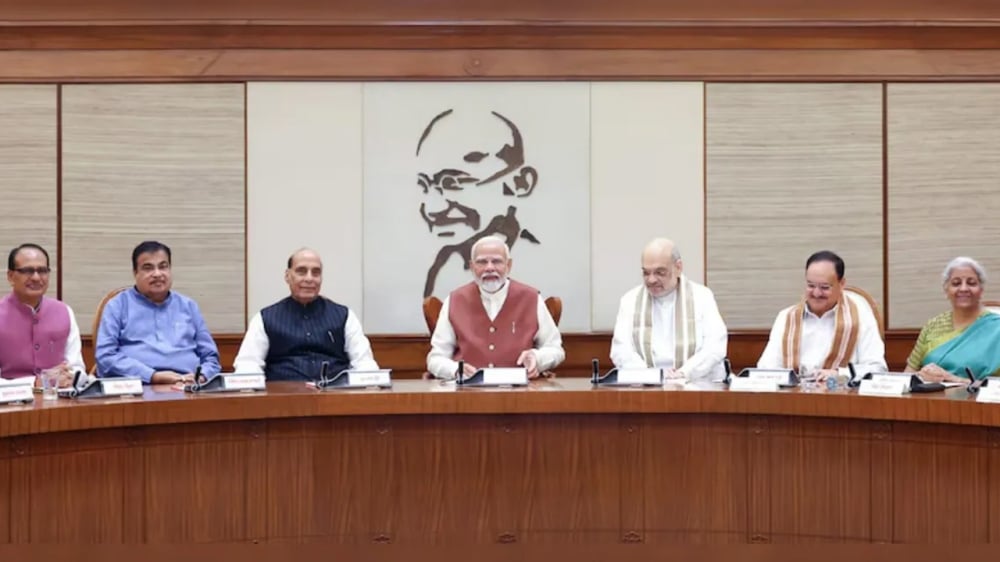
The cabinet headed by Prime Minister Narendra Modi has approved the proposal of one country one election in India. In the meeting held on Wednesday, the Modi cabinet approved the proposal to hold general elections in the country. According to the information, information about the decisions taken in the Modi cabinet meeting will be given at 3 pm.
Modi cabinet approves 'One Nation-One Election' proposal
The Modi cabinet has approved the proposal of 'One Nation-One Election'. Let us tell you that the Kovind Committee has given a report in this regard. Let us tell you that the committee headed by former President Ram Nath Kovind submitted its report on the possibilities of One Nation One Election in March. According to the suggestions given in this report, as a first step, elections of Lok Sabha and state assemblies should be held simultaneously. The committee has further recommended that local body elections should also be held within 100 days of the Lok Sabha and state assembly elections being held simultaneously. This will enable elections at all levels across the country to be held within a fixed time frame. Currently, state assembly and Lok Sabha elections are held separately.
What is one nation one election?
It is worth noting that at present, the state assembly elections and the country's Lok Sabha elections are held at different times in India. One Nation One Election means that Lok Sabha and assembly elections should be held simultaneously across the country. That is, voters will vote on the same day, at the same time or in phases to elect members of the Lok Sabha and state assemblies. It is worth noting that after independence, Lok Sabha and assembly elections were held simultaneously in 1952, 1957, 1962 and 1967, but in 1968 and 1969 many assemblies were dissolved prematurely. After which the Lok Sabha was also dissolved in 1970. Due to which the tradition of one country, one election was broken.
Lakhs of rupees can be saved
When the Modi government came to power in May 2014, the debate on one country and one election started immediately. In December 2015, the Law Commission released a report on One Nation-One Election. It was said that if Lok Sabha and Assembly elections are held simultaneously in the country, crores of rupees can be saved. Apart from this, development work will also not be affected due to the non-implementation of the election code of conduct repeatedly. Elections are held every month in the country and there are expenses in it. Due to the implementation of the code of conduct, many administrative works have also stopped. Keeping these things in mind, it was recommended to hold simultaneous elections in the country in 2015. In June 2019, for the first time, PM Modi formally called a meeting with all the parties to discuss this issue. However, many parties opposed it. However, the cabinet headed by Prime Minister Narendra Modi has approved the proposal of one country one election in India. In the meeting held on Wednesday, the Modi cabinet has approved the proposal to hold general elections in the country.
How to implement One Nation One Election in the country
The Law Commission issued a public notice in April 2018 detailing the amendments. According to the Law Commission, the One Nation One Election proposal will also impact Article 328 of the Constitution, which may require the approval of maximum number of states. According to Article 368(2) of the Constitution, such an amendment requires the approval of at least 50% of the states, but 'One Nation, One Election' may impact the powers and jurisdiction of each state legislature. Therefore, approval of all state legislatures may be required in this regard. After this, many other laws including the Representation of the People Act will have to be amended.
Why 'One Nation, One Election'?
Before the announcement of the Kovind-led panel last year, Union Law Minister Arjun Ram Meghwal outlined the government’s rationale, and listed some potential hurdles. Mr Meghwal told Parliament that simultaneous elections represent financial savings, as they reduce the deployment of election officials and security forces multiple times a year, and reduce the expenditure incurred by political parties on their campaigns and the public exchequer. He also pointed out that asynchronous voting means that the code of conduct is invoked frequently, which affects the implementation of welfare schemes, whether by the Centre or the states…
 look news india
look news india